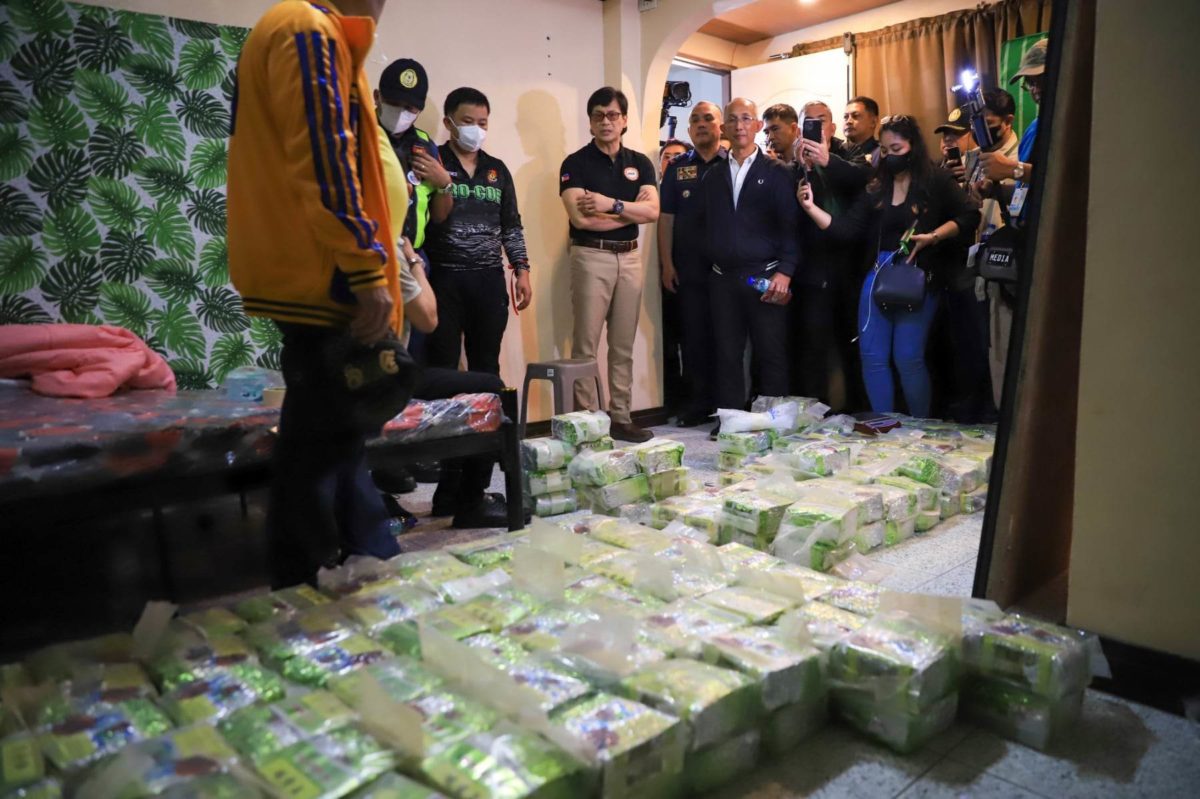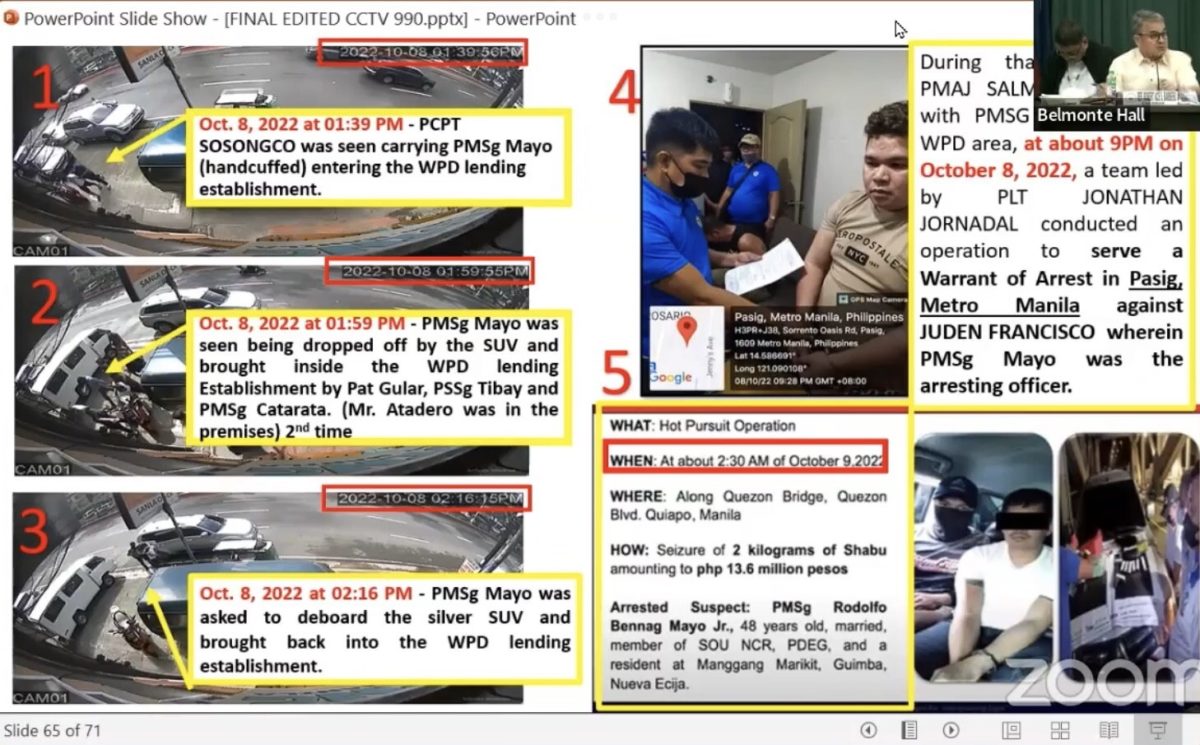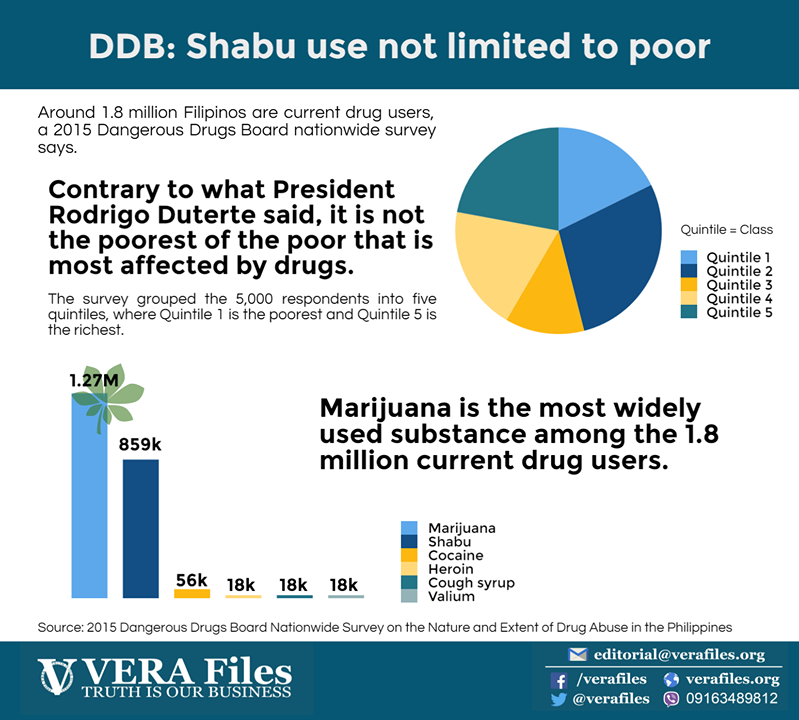More than six months have passed and the police have yet to locate some 338 kilograms of shabu stolen by operatives of the Philippine National Police Drug Enforcement Group (PDEG) during an operation in Manila.
While thousands of suspected drug users have died under the previous administration’s war on drugs, the so-called ninja cops, or police operatives involved in the resale of confiscated prohibited drugs, seem to get away with crimes far worse than what those who allegedly fought back have committed.
During a seven-hour inquiry of the House Committee on Dangerous Drugs on April 26, Rep. Romeo Acop of Antipolo City, a former director of the PNP Criminal Investigation and Detection Group, managed to extract the information from Col. Rolando Portera, chief of the PDEG’s Intelligence and Foreign Liaison Division (IFLD), that the pilfered drugs from the P6.7 billion worth of shabu haul in Manila on Oct. 8, 2022 were around 380 kg.
Portera said SMS Jerrywin Rebosora had admitted keeping 30 kg from the shabu haul from the Wealth and Personal Development (WPD) lending office on Jose Abad Santos Avenue, Sta. Cruz, Manila. This would supposedly go to the confidential informant in exchange for the “quality information” that led to the seizure of at least 990 kg of shabu.
But when asked to surrender what they had set aside, Rebosora sent two pieces of luggage which were later found to contain 42 kg of shabu.
However, Portera said a closed-circuit television (CCTV) footage obtained during a post-operation investigation showed at least three police operatives loading 19 pieces of luggage into a white sedan parked near the WPD office.
Rebosora has denied Portera’s statement and invoked his right to remain silent and right against self-incrimination when pressed with more questions.
The remaining 338 kg of shabu that have yet to be accounted for would amount to at least P2.28 billion, based on the estimated value of P6.75 million per kg. Where this huge volume of the illicit drug has gone is anybody’s guess. But the rogue police officers behind this devilry have yet to be held accountable.
And if the operatives, who were Portera’s colleagues in the IFLD, indeed pilfered 380 kg of shabu, then the volume of shabu found in the WPD lending office on Oct. 8 would sum up to 1, 370 kg or 1.37 tons with an estimated value of P9.25 billion.
How could MSg. Rodolfo Mayo, a PDEG intelligence officer who has been detained following his identification as the owner of WPD lending firm, have that much shabu? Was he keeping it for somebody else? Where did it come from? Has he been the keeper of pilfered drugs from previous operations of PDEG? Were the colonels and generals unaware of this?
Mayo was a ninja cop in the Manila Police District and was sent to Basilan as a punishment when Sen. Ronald “Bato” Dela Rosa was PNP chief. However, LtCol. Arnulfo Ibañez, who has been relieved as officer in charge of the Special Operations Unit of the PDEG-NCR, brought him back to PDEG. Ibañez himself was in the watch list and was sent to Region 7 as a punishment but was called to the PDEG-NCR in 2020.
This practice was called “reprojection,” or the reassignment of law enforcers whose reputation had been tainted by anomalies to give them a second chance to reform.
Senators and congressmen investigating the P6.7 billion shabu haul have raised questions on the wisdom behind this reprojection policy as they quiz the operatives on various aspects of the police operations against illegal drugs.
Meantime, a raid on Naguilian Road in Baguio City on March 29 yielded 575 kg of shabu that were packed similar to those seized in the October 8 Manila operation.
BGen. Narciso Domingo, who has been relieved as director of the PDEG, told the House committee that the shabu hauls from the Baguio and Manila operations could have the same source.
He pointed to LtCol. Glenn Gonzales from the Quezon City Police District and formerly with IFLD, who could provide information about it. He said the raided Baguio warehouse is just about 1 kilometer away from a residence of Gonzales.
Gonzales said that while his residence was indeed a short distance from the raided warehouse, he knew nothing about the drug operation there.
Domingo asserted that an informant of Gonzales was used in the Baguio raid.
The group of Mayo was said to be “actively engaged in selling and distribution” of shabu in Cavite, Laguna, Manila, Pasig, Bulacan, Tarlac and other neighboring cities in Luzon.
The contradictory versions on the many aspects of the Oct. 8 drug operation and the possible participation or knowledge of high-ranking PNP officials on this seemingly old practice of setting aside a substantial portion of confiscated drugs as compensation to informants, which the officials themselves handle, must come to an end.
President Ferdinand Marcos Jr. should now step in and handpick conscientious and law-abiding officers to get to the bottom of these drug syndicates that have apparently infiltrated the police organization.
He should cleanse the PNP, particularly its anti-drug agencies, of misfits. End the practice of “reprojecting” officers who had been linked to or implicated in illegal drugs, especially those who had been included in the National Illegal Drug Watchlist but have found their way to call the shots in the government’s anti-drug operation. It now appears that officers who had been “reprojected” into the PDEG turned out to become protectors of certain drug traders.
Is it farfetched to think that police officers themselves have formed their own drug syndicate, competing with those they should be busting?
The views in this column are those of the author and do not necessarily reflect the views of VERA Files.
This column also appeared in The Manila Times.



